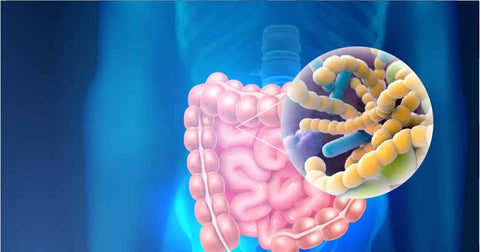Introduction
Enzymes are proteins in the body that stimulate chemical reactions in the body for various functions. One such function is digestion, and the enzymes responsible for digestion are digestive enzymes. These are produced by the cells lining the digestive tract and pancreas.
Digestive enzymes break larger compounds in foods such as carbohydrates, protein, and fat into smaller compounds easily absorbed from the gastrointestinal tract into the blood. The major digestive enzymes are broadly classified into:
- Amylase: Helps break down carbohydrates into simpler forms of sugar, such as disaccharides and monosaccharides.
- Protease: Helps to break down protein into amino acids
- Lipase: Helps to break down fat into fatty acids and triglycerides.
Other enzymes are sucrase (breaks down sucrose), maltase (breaks down maltase), and lactase( breaks down lactose).
Certain conditions can result in digestive enzyme deficiencies, such as lactose intolerance and exocrine pancreatic insufficiency. Exocrine glands release (secrete) substances through openings (ducts) onto your body surfaces. Exocrine glands secrete sweat, tears, saliva, milk and digestive juices. These intolerances and insufficiencies can generally cause symptoms such as indigestion, bloating abdominal pain, and gas which can be treated by taking enzyme supplements.
This article discusses digestive enzymes and their functions. It also intends to explain some enzyme insufficiencies and their treatment.
What Are Digestive Enzymes?
Digestion is the process of breaking down complex nutrients present in food into simpler compounds that can be absorbed to provide energy, help in growth, and process various vital functions in the body. This process involves multiple enzymes secreted into the digestive tract, referred to as "digestive enzymes."
The process starts in the mouth and continues in the gastrointestinal tract. Digestive enzymes are made in the stomach, small intestine, and pancreas. Most of the enzymes are made in the pancreas, which breaks down carbohydrates, protein, and fats.
Types of Digestive Enzymes

Types of Digestive Enzymes
There are different types of digestive enzymes which are categorized based on the nutrient they target and the reaction they catalyze. Digestive enzymes and their functions are explained below:
Amylase
The Amylase enzyme helps in the breakdown of carbohydrates. The pancreas mainly produces the enzyme, but it is also produced in the salivary glands.
The amylase enzyme produced in the salivary glands is called ptyalin, which starts the digestion of starch in the mouth and remains active even after swallowing.
Amylase, produced by the pancreas, is secreted into the small intestine, breaking down complex carbohydrates into simple sugars that are ultimately converted to glucose by other enzymes. Glucose is finally absorbed and enters the blood circulation.
Amylase levels can be measured to diagnose certain conditions. Lower amylase levels are present in chronic pancreatitis and liver disease conditions. Higher amylase levels suggest acute pancreatitis or pancreatic cancer.
Lipase
Lipase is an enzyme that causes the breakdown of lipids into fatty acids and glycerol. These compounds are helpful for the long-term storage of energy and for maintaining cellular health. The pancreas and small intestine produce the enzyme.
An increase in lipase levels can be measured as well as a deficiency, indicating acute inflammation of the pancreas, known as acute pancreatitis.
Proteases
Proteases are the enzymes responsible for digestion and breaking down protein into amino acids. Amino acids are the building blocks of various proteins, such as enzymes, clotting factors, and immune cells. These proteins are responsible for building muscle mass, clotting, immune functions, and several chemical reactions in the body.
The major proteases produced in the body are :
- Pepsin: Pepsin is the protease enzyme secreted in the stomach, which causes the breakdown of protein into smaller peptides and amino acids. These smaller peptides are further broken down into amino acids in the small intestine for absorption.
- Trypsin: Trypsinogen is produced in the pancreas, which gets activated in the small intestine into trypsin. Trypsin activates other protease enzymes, such as carboxypeptidase and chymotrypsin, to further break down protein into peptides and amino acids.
Lactase
Lactose is a type of sugar found in milk and dairy products. The lactase enzyme breaks down lactose into glucose and galactose; then, bacterial enzymes ferment the remaining lactose.
The lactase enzyme is found in the cells lining the intestinal tract, known as enterocytes. The deficiency of the lactase enzyme is a common condition affecting many people, which is known as lactose intolerance.
Maltase
Amylase converts complex starch into maltose. Maltose is converted into glucose by the enzyme maltase. Glucose is used by the body to provide energy, and it is stored in the liver and muscles as glycogen. Glycogen can be converted to glucose for energy whenever required.
Sucrase
Sucrase is the enzyme that breaks down sucrase (found in table sugar) into glucose and fructose. Both glucose and fructose are absorbed in the small intestine and enter the circulation for further use.
What Are Digestive Enzymes Deficiencies?
There are certain conditions in which there is a complete lack of enzymes, or there is a reduced synthesis of digestive enzymes. In these conditions, foods cannot be digested properly, causing various digestive symptoms and nutritional deficiencies. Some of the digestive enzyme deficiencies are explained below:
Lactose Intolerance
It is a condition in which there is insufficient production of the lactase enzyme, resulting in a build-up of lactose which gets fermented by the bacterial enzyme, resulting in the production of gas and causing symptoms such as bloating, abdominal pain, diarrhea, and gas. The symptoms are worsened by the consumption of foods containing lactose, such as milk and milk products.
Exocrine pancreatic insufficiency

What Are Digestive Enzymes Deficiencies
The pancreas is an organ responsible for the production of the major digestive enzymes required for the digestion of carbohydrates, proteins, and fat. So, if there is a deficiency of digestive enzyme production by the pancreas, it's called exocrine pancreatic insufficiency. The symptoms associated with the condition are bloating, abdominal cramps, fatty diarrhea, excessive gas, an oily stool that is sticky and difficult to flush, and unintentional weight loss.
There are certain conditions that can cause exocrine pancreatic insufficiency, as mentioned below.
- Cystic fibrosis: It is a genetic condition affecting the lungs and digestion. Secretions from the respiratory tract or pancreas get thickened, resulting in blockage and causing inflammation of the pancreas.
- Chronic pancreatitis: It is an inflammation of the pancreas.
- Pancreatic cancer
- Gastrointestinal surgeries
- Celiac disease
- Type 1 diabetes mellitus
Foods Rich in Digestive Enzymes
 foods rich in digestive enzymes
foods rich in digestive enzymes
Tropical fruits and fermented vegetables are generally rich in certain digestive enzymes that can speed up the process of digestion. Advanced Food Intolerance Labs kits are available that can be used to guide you regarding food intolerances to avoid foods you are intolerant to.
Some of the foods rich in these specific enzymes are:
- Foods rich in proteases: Pineapple, papaya, kiwi, and ginger.
- Foods rich in amylase: Mango, banana, and honey.
- Foods rich in lipase: Avocado, kefir, and kimchi
What Are Digestive Enzyme Supplements
People who have enzyme insufficiencies might consider taking enzyme supplements in their diet. As mentioned above, there are specific diets with a good source of enzymes. However, these dietary sources might not be enough to fulfill the requirements. So, it is worth considering enzyme supplements.
Enzyme supplements are available in pills, powders, and liquids. These supplements are sourced from plants, animals, or microorganisms. Some supplements are prescription-only drugs, and some are available as over-the-counter drugs. However, it is always better to take these supplements under the instruction of healthcare providers to make sure that it is safe for you to take them.
Prescription supplements are recommended for conditions affecting the pancreas, such as chronic pancreatitis and pancreatic cancer. These supplements are called pancreatic enzyme replacement therapy (PERT). PERT includes supplements containing amylase, lipase, and protease, which help to break down carbohydrates, fats, and protein. The FDA does not regulate over-the-counter supplements. They could include amylase, lipase, and protease. Some of them have the enzymes lactase and alpha-galactosidase (which the body cannot produce even in healthy individuals without an enzyme deficiency).
Conclusion
Digestive enzymes are the proteins that help in the digestion of foods we take. Digestion is the process of breaking down complex nutrients present in food into simpler forms that can be easily absorbed into the bloodstream for their function. The major digestive enzymes are protease, lipase, and amylase, which help in the digestion of protein, fat, and carbohydrates, respectively. These enzymes are mostly secreted by the pancreas, salivary glands, and the cells lining the stomach and small intestine.
Most digestive enzymes are kept at an optimal level by following a balanced diet and maintaining healthy physical activity. There are certain conditions in which digestive enzymes are deficient, causing various symptoms related to indigestion and nutritional insufficiency.
Foods containing digestive enzymes can be included in the diet for the treatment of milder forms of enzyme insufficiency. There are also various supplements available for digestive enzyme insufficiency. However, you should inform your doctor before taking any enzyme supplement to ensure it is safe for you.
Watch AFIL test kits testimonial videos click here
Source
- Whitcomb, D. C., & Lowe, M. E. (2007). Human pancreatic digestive enzymes. Digestive diseases and sciences, 52(1), 1-17.
- Ianiro, G., Pecere, S., Giorgio, V., Gasbarrini, A., & Cammarota, G. (2016). Digestive enzyme supplementation in gastrointestinal diseases. Current Drug Metabolism, 17(2), 187-193.
- Corring, T. (1980). The adaptation of digestive enzymes to the diet: its physiological significance. Reproduction Nutrition Développement, 20(4B), 1217-1235.
- Lindkvist, B. (2013). Diagnosis and treatment of pancreatic exocrine insufficiency. World Journal of Gastroenterology: WJG, 19(42), 7258.
- Swagerty Jr, D. L., Walling, A., & Klein, R. M. (2002). Lactose intolerance. American family physician, 65(9), 1845.



.png?v=1737390083)
.png?v=1737187409)


